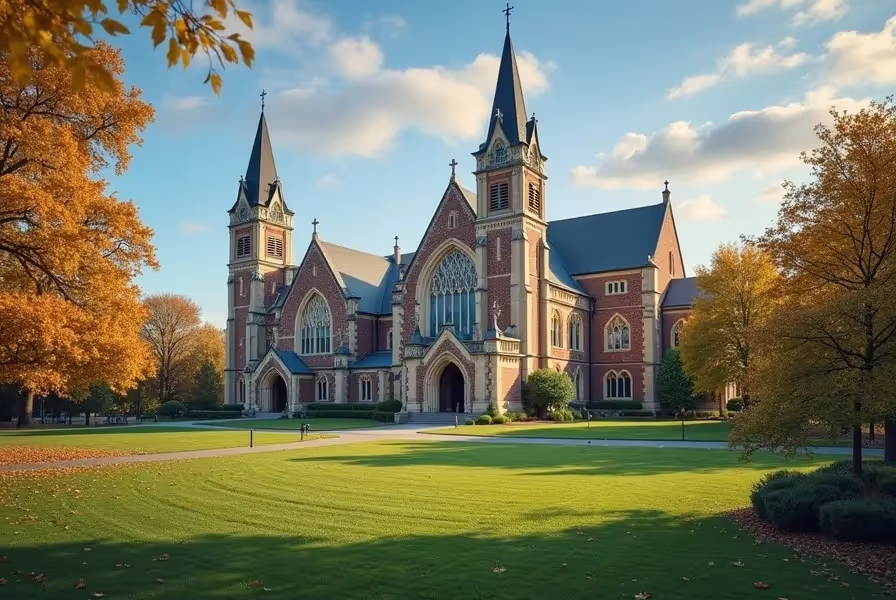Understanding the Key Differences Between Catholic and Christian Colleges
Choosing the right college is a major decision, especially if you want a faith-based education. Two common types of religious institutions in the U.S. are Catholic colleges and Christian colleges. While both are rooted in Christian traditions, they differ in doctrine, campus life, and academic emphasis.
This guide will help you understand the differences between Catholic and Christian colleges so you can make an informed and confident choice for your higher education journey.
What Makes a College “Catholic”?
Catholic colleges are institutions affiliated with the Roman Catholic Church. Many are founded and operated by Catholic religious orders such as Jesuits, Franciscans, or Benedictines. These schools follow guidelines set by the Vatican or National Catholic educational associations.
Here are some key features of Catholic colleges:
- Rooted in Catholic theology and tradition
- Often include mandatory theology or philosophy courses
- Structured campus ministries and regular Mass services
- Emphasis on social justice, community service, and ethics
- Open to students of all faiths, but the Catholic identity is visible
Catholic universities often have a global network and strong liberal arts programs. Examples include Georgetown University, University of Notre Dame, and Boston College.
What Defines a Christian College?
Christian colleges are broader in scope. These institutions identify with Protestant denominations or non-denominational Christianity. Their beliefs are centered on the Bible, often with Evangelical traditions and values.
Key characteristics of Christian colleges include:
- Biblical worldview integrated into all subjects
- Chapel services and Bible study groups
- Honor codes that reflect scriptural values
- Faculty and staff may be required to affirm faith statements
- Programs designed to promote leadership, service, and spiritual growth
Notable Christian colleges include Wheaton College, Liberty University, and Baylor University. These schools may vary in how strictly they apply religious doctrine to campus life and education.
How Do Academic Programs Compare?
Both Catholic and Christian colleges offer strong academics, but there are differences in focus and delivery:
- Catholic colleges often emphasize liberal arts, humanities, and social justice. Many excel in international programs, philosophy, business, medical ethics, and law.
- Christian colleges focus on incorporating faith into all disciplines. Majors may include Biblical studies, ministry, counseling, communications, and applied sciences with a Christian lens.
If you're looking for a career in ministry or religious education, Christian colleges may provide more specialized training. Catholic universities may offer a broader theological spectrum within a traditional academic framework.
Do Catholic and Christian Colleges Have Different Campus Cultures?
Yes, campus culture is one of the most noticeable differences.
Catholic colleges allow a variety of viewpoints and experiences. Their campuses tend to be more diverse and inclusive of other faiths. While Catholic traditions are present, they are not always enforced in daily life.
Christian colleges, especially those that are Evangelical or denominational, may have stricter rules and religious guidelines. These can include lifestyle agreements, curfews, or mandatory chapel attendance. The community is tightly-knit, and students often share similar values and beliefs.
Are Non-Catholics Welcome at Catholic Colleges?
Absolutely. Catholic colleges welcome students of all faith backgrounds. You're not required to be Catholic to attend. However, you will likely take courses in Catholic theology or ethics. These are designed to encourage dialogue and deeper understanding, not to convert.
Campus resources such as counseling, volunteering, and spiritual guidance are typically available to everyone, regardless of faith tradition.
Can You Attend a Christian College If You're Not Christian?
It depends on the school. Some Christian colleges are open and inclusive to all students, while others may require a statement of faith or expect students to live according to specific biblical principles.
Before applying, look at:
- Admissions policies and religious requirements
- Student handbook or lifestyle expectations
- Course selection and required religious studies
Ask yourself what kind of spiritual environment you want to be part of. The right college will support both your academic and personal growth.
Which Type of College Is Right for Me?
Here are a few questions to help guide your decision:
- Do I want an education grounded in a specific denomination?
- How important is daily worship and a religious community?
- Am I comfortable with religious courses or chapel requirements?
- Do I want a more traditional or contemporary approach to faith?
- What are the school’s views on diversity and inclusion?
Your college experience should enrich your mind and spirit. Whether you choose a Catholic or Christian college, both can offer meaningful education and lasting connections.
Frequently Asked Questions About Christian vs. Catholic Colleges
Do Catholic colleges teach only Catholic doctrine?
No. While courses may include Catholic teachings, many Catholic colleges welcome diverse viewpoints and encourage open discussions on spirituality, ethics, and theology.
Are Catholic schools considered Christian colleges?
Yes, since Catholicism is a branch of Christianity, Catholic schools can be considered Christian colleges. However, in higher education, "Christian colleges" usually refer to Protestant or Evangelical institutions.
Is one type of college more academically rigorous than the other?
Academic rigor depends on the individual school, not its religious affiliation. Both Catholic and Christian colleges offer top-tier programs, professors, and research opportunities.
Can I pursue non-religious majors at religious colleges?
Yes. Both Catholic and Christian colleges offer a wide range of majors, from engineering to business to music. Faith may be integrated into the curriculum, but the secular disciplines are fully accredited and respected.
Are there scholarships for attending a religious college?
Many Catholic and Christian colleges offer scholarships based on faith affiliation, community service, academic merit, and financial need. Explore each school's financial aid offerings during your search.
Final Thoughts: Choose the Path That Best Aligns With Your Values
Catholic and Christian colleges each offer unique experiences. One may emphasize tradition and global ethics, while the other may focus on a scriptural foundation and community discipleship.
Take time to explore campus life, curriculum, and spiritual support. Speak with current students. Visit campuses. Most importantly, choose the environment where you can grow intellectually, spiritually, and personally.
Your faith and education can move forward together. With the right guidance and clarity, you'll find a college where you feel challenged, supported, and inspired.










.svg)



